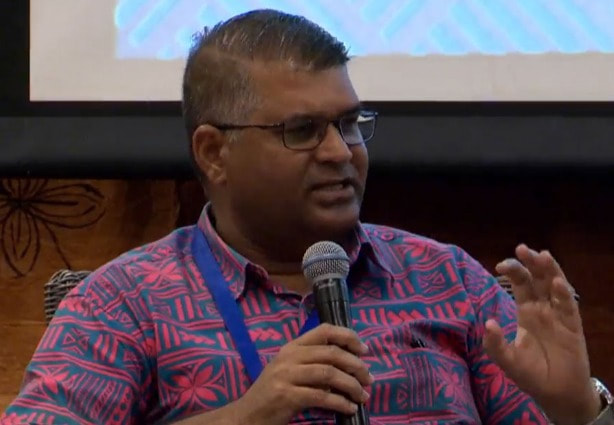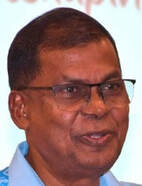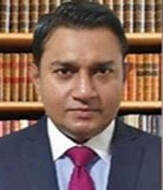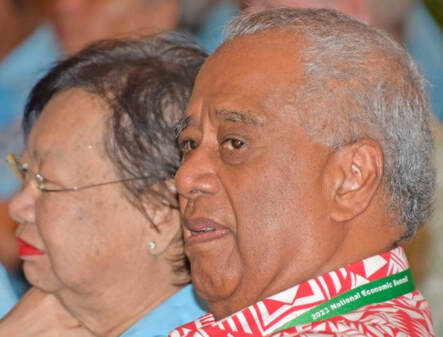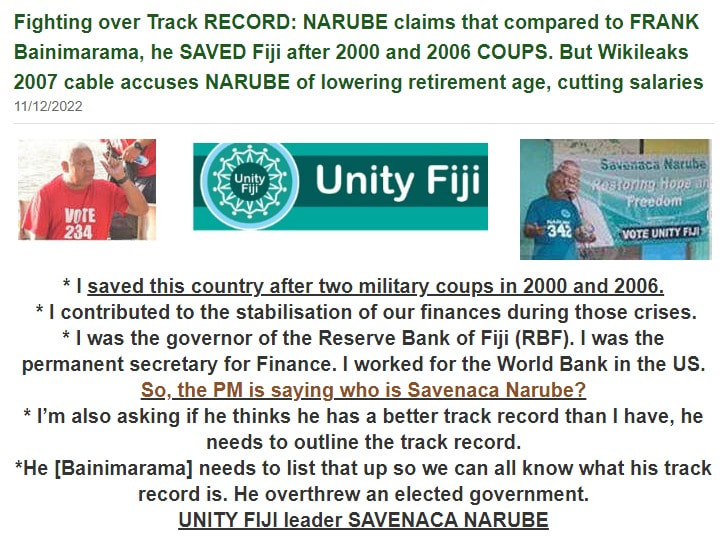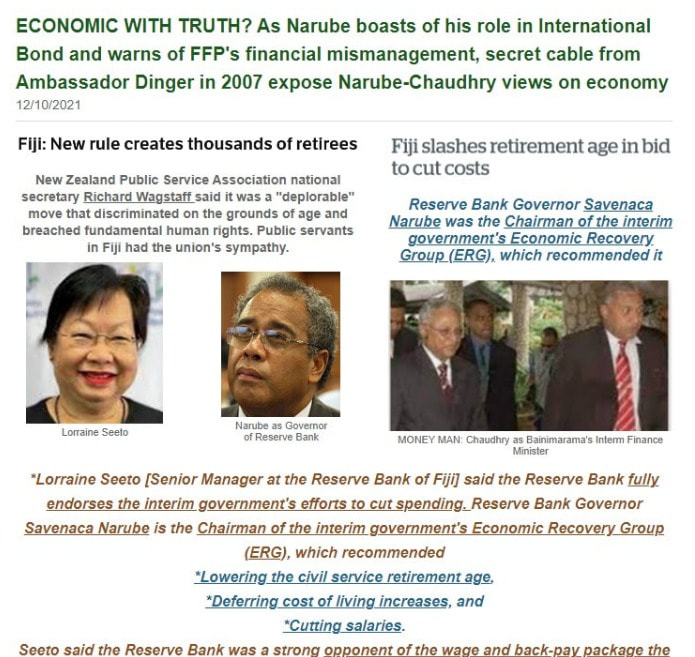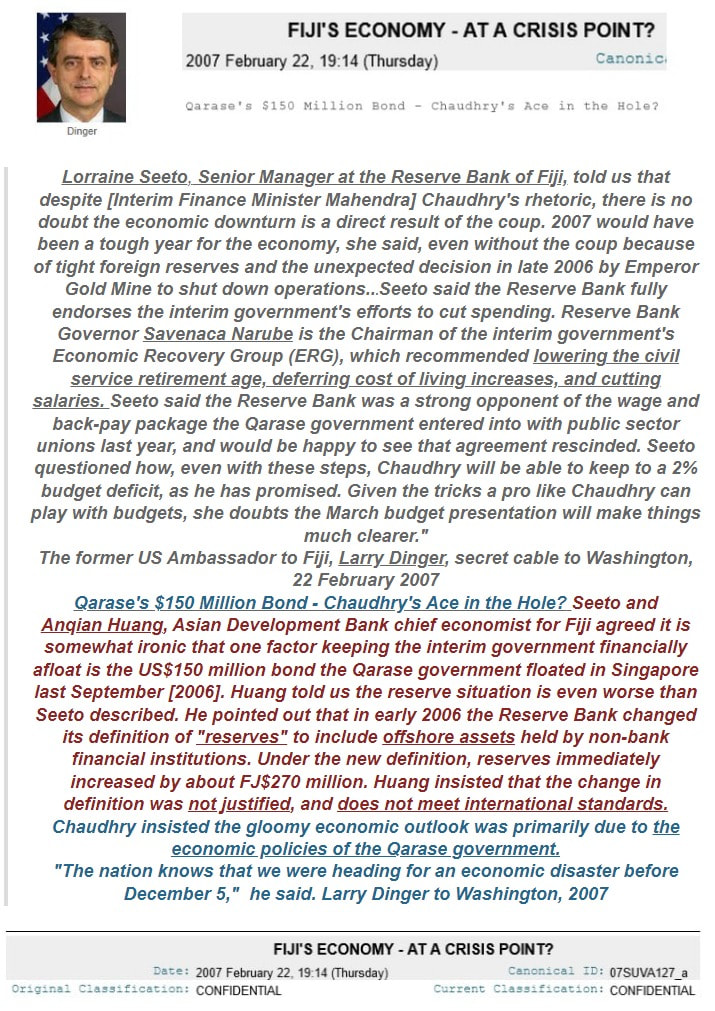*JOHN RABUKU, former acting DPP and FICAC lawyer, most likely to replace Aslam at FICAC
*The former PS PAULA ULUINACEVA or FILIMONE WAQABACA, most likely candidates to replace Ariff Ali at Reserve Bank of Fiji
UNITY FIJI LEADER and former RBF Governor Savenaca Narube also TOUTED by some but Fijileaks doubts he has any chance to replace Ali
From Fijileaks Archive, 11 December 2022
Summary
1. (C) Fiji will experience a severe economic downturn in 2007 as an after-effect of the December 2006 coup. Foreign reserves are very low (perhaps much lower than they appear in the Reserve Bank's end-of-year accounts), exports are flat, and levels of new investment are expected to be minimal. The major hope for the economy is a rapid tourism rebound, but tourism leaders tell us they expect a significant drop in revenue caused by lower visitor levels and deep discounts.
Fiji Reserve Bank officials tell us they are determined to avoid a devaluation or other drastic action that would reverberate throughout the economy. How the interim government deals with the economy will play a big role in determining the level of discontent in Fiji over the coming months and will have a direct impact on the stability of the current regime.
Chaudhry Says GDP Will Fall 2-4% in 2007
2. (C) As noted reftel, Interim Minister of Finance Mahendra Chaudhry went public earlier this month with an estimate that Fiji's economy will contract 2-4% in 2007. Chaudhry insisted the gloomy economic outlook was primarily due to the economic policies of the Qarase government.
"The nation knows that we were heading for an economic disaster before December 5," he said.
Lorraine Seeto, Senior Manager at the Reserve Bank of Fiji, told us that despite Chaudhry's rhetoric, there is no doubt the economic downturn is a direct result of the coup. 2007 would have been a tough year for the economy, she said, even without the coup because of tight foreign reserves and the unexpected decision in late 2006 by Emperor Gold Mine to shut down operations.
Exports, which fell about 5% in 2006 from 2005 levels (primarily due to textile declines), have shown few signs of picking back up. Nevertheless, the Reserve Bank projects that the economy would have grown 1-2% if the coup had not taken place. The coup has had a direct negative impact on tourism, investment, and consumption, Seeto said, above and beyond other factors.
3. (C) Seeto thinks the GDP forecast announced by Chaudhry might be too pessimistic. She believes GDP will drop about 2%. Seeto admitted, however, that some optimistic assumptions are built into her forecast, In mid-December the Reserve Bank's best estimate was that GDP would drop up to 10% in 2007. A projected rebound in tourism led the Bank to improve its forecast. Seeto admitted that other optimistic assumptions are built into the GDP forecast, including the assumption that EU funds to assist Fiji's sugar industry will not be cut off (Fiji and the EU are expected to hold consultations on EU aid in Brussels in March or April).
Anqian Huang, Asian Development Bank chief economist for Fiji, told us he believes the minus 2-4% GDP forecast is reasonable. Closing the Emperor Gold Mine will hurt (losing about FJ$50 million in exports), but other export sectors, such as agriculture, sugar, and mineral water, should not be affected by the coup, thus keeping the GDP downturn from turning into a free fall.
Financial Reserves on the Brink
4. (C) While the GDP numbers are worrying, Seeto and Huang both said their biggest concern is Fiji's low financial reserve level. The Reserve Bank's end of 2006 report puts reserves at FJ$832 million (US$492 million), or about 3.3 months of imports, up from 2.5 months of imports in mid-2006. Seeto said the numbers are misleading because they include US$150 million (FJ$250 million) in proceeds from a bond issued by the Qarase government on international markets last September and FJ$60 million in deferred fuel payments. If those two elements are deducted, Fiji's reserves would only be FJ$520 million, or a little over two months of imports.
5. (C) Huang told us the reserve situation is even worse than Seeto described. He pointed out that in early 2006 the Reserve Bank changed its definition of "reserves" to include offshore assets held by non-bank financial institutions. Under the new definition, reserves immediately increased by about FJ$270 million. Huang insisted that the change in definition was not justified, and does not meet international standards.
Andrew Milford, economist at the Pacific Financial Technical Assistance Center, an IMF-World Bank joint venture, told us the Reserve Bank's action was "borderline," and he was unaware of any other country using a similar definition of reserves. Nevertheless, the IMF had reluctantly agreed to the change, with the stipulation that those funds must be readily accessible to the Reserve Bank. He said the new definition allows the Bank to include offshore assets of the Fiji National Provident Fund (FNPF), Fiji's social security system, in its reserve calculations. Milford said Fiji tapped FNPF overseas funds at least once during the Qarase administration, and is likely to do so again, given the current shaky reserve situation. (Comment: It appears that the majority of Fiji's financial reserves now consist of a) proceeds from the USD$150 million bond offering, and b) offshore holdings of the FNPF. If those two items were deducted, Fiji's reserves would fall to about FJ$250 million, or one month's supply of imports. End comment.)
Qarase's $150 Million Bond - Chaudhry's Ace in the Hole?
6 (C) Seeto and Huang agreed it is somewhat ironic that one factor keeping the interim government financially afloat is the US$150 million bond the Qarase government floated in Singapore last September. The five-year bond was snapped up by investors at 7% interest. Heavy demand for the bond (it was oversubscribed by nearly 700%) pushed its interest rate down from the initial price guidance of 7.25%. Seeto commented that investors, who purchased the bond at a time which Fiji's prospects seemed bright, have not done well. Since the coup, the bond's value has dropped by about 10% from face value. From the Reserve Bank's perspective, however, the timing of the bond offering was perfect. There is no way, said Seeto, that Fiji could now borrow at anything close to a 7% rate.
Huang pointed out that the dismal performance of the Fiji bond over the past three months does not bode well for future Fiji borrowing on international markets. Moreover, in only five years Fiji will have to pay back the money it borrowed. Where will those funds come from?
7. (C) Seeto and Huang noted that, having already used the bond to inflate reserve levels at the end of 2006, Chaudhry is likely to use the bond proceeds to keep the deficit under control in the new budget he will announce in March. Seeto said she doesn't see how Chaudhry can avoid converting the bond proceeds (now denominated in U.S. dollars) into Fiji dollars to help pay bills. If he does this, however, reserve levels will drop sharply. It's a difficult balancing act, one that has received almost no publicity or public scrutiny. Seeto said the only other option is to borrow heavily on the domestic market. She noted that Chaudhry, long a critic of government borrowing from FNPF, is now (privately) a proponent of such borrowing.
What's the Interim Government's Fiscal Situation? The Reserve Bank Doesn't Know
8. (C) Seeto said that, in theory, the Reserve Bank is supposed to have access to all government financial records, including weekly debit and credit receipts. The reports the Bank is now getting, however, are far from complete. Therefore, the Bank has a very limited understanding of the interim government's fiscal situation, and even less information about military spending. Anecdotal reports, however, indicate that the regime is having real trouble paying its bills. Seeto noted that Fiji's tax authority had been unable to process tax refunds in a timely manner and that every ministry she talks to complains about being short of the funds needed to meet their obligations.
(Note: We made several requests to the Ministry of Finance for working level meetings to discuss Fiji's fiscal situation and the budget. All went unanswered. End note.)
Policy Steps to Ease the Financial Crunch
9. (C) Seeto said the Reserve Bank fully endorses the interim government's efforts to cut spending. Reserve Bank Governor Savenaca Narube is the Chairman of the interim government's Economic Recovery Group (ERG), which recommended lowering the civil service retirement age, deferring cost of living increases, and cutting salaries. Seeto said the Reserve Bank was a strong opponent of the wage and back-pay package the Qarase government entered into with public sector unions last year, and would be happy to see that agreement rescinded. Seeto questioned how, even with these steps, Chaudhry will be able to keep to a 2% budget deficit, as he has promised. Given the tricks a pro like Chaudhry can play with budgets, she doubts the March budget presentation will make things much clearer.
How About a Devaluation?
10. (C) Seeto says she gets calls from reporters "almost daily" asking about prospects for a devaluation of the Fiji dollar. A devaluation, she told us, would only be an act of last resort by the Reserve Bank, but could take place if reserve levels were to drop precipitously. Because Fiji is heavily import-dependent, a devaluation - with its resulting higher price for imports - would mean an immediate drop in the standard of living for most Fijians and would especially impact the poor. Seeto thinks the Finance Ministry would be willing to take far more drastic steps to reduce government spending rather than risk a devaluation. The ADB's Huang said he understands why the interim government and Reserve Bank oppose a devaluation, but he insisted that a devaluation is the only action that makes sense from a long-term perspective. With reserves this low and no prospect of an export or investment boom in the near future, a devaluation is the only way to achieve economic equilibrium.
Banking on Tourism is Premature
11 (C) As Seeto noted, any optimism about Fiji's economy stems from the widely-accepted notion that tourism is poised to bounce back. Members of Fiji's private sector Tourism Action Group (TAG), consisting of representatives from hotels, airlines, and tour companies, told the Ambassador February 22 that the interim government has unrealistic expectations about tourism. The next four months are likely to be "quite bad" they said, with many hotels showing occupancy rates in the 20-40% range. Many hotels with higher occupancy have relied on price cuts of 40% or more and are not making any money. Tourism operators are banking on improved occupancy and rates during the peak tourist season, May to October. TAG estimates that if tourism "returns to normal" by May, industry revenue will still be down FJ$120 million (about USD 75 million) from pre-coup projections. They emphasize that forecast is very optimistic - occupancy rates may go up, but rates may not return to pre-coup levels for a long time.
Moreover, several new hotels have opened in the last year, and more are scheduled to open in 2007, making the struggle to make a profit even harder. 12. (C) The TAG group complained that some government departments and a number of academics "have been working overtime churning out numbers" to show that tourism is recovering. If those academics were to plant their feet on the ground and look at things like a businessman, they'd realize things are not so rosy. The TAG members say they are worried that Chaudhry will view tourism as a "cash cow" he can tap into to fund government programs. They see possible new duties on "luxury" goods used in the tourism sector, new taxes on tourists, and additional income and corporate taxes. (Note: On February 13, Fiji's Department of Immigration proposed a new visa/permit fee it said could raise FJ$10 million per year. The interim cabinet has not made a decision on the proposed fee. End note.)
Dixon Seeto, Head of the Fiji Hotel Association and a TAG member, recounted how at a meeting with the interim government he commented that "to take the economy forward, it is not advisable to make everyone poor." He told us the reaction to the comment "by Chaudhry's socialist advisors" was distinctly negative.
Other Industries Worried Too
13. (C) Rajesh Punja, head of the food manufacturer and importer Punjas, also told us he is worried about interim government actions that could harm industry. Punja said various sources tell him that, with money tight and poverty levels rising, Chaudhry will cut import tariffs on food items to placate his main constituency, the poor. This will have the unintended consequence of crippling Fiji's fledgling food manufacturing industry. Punjas has a plan in place to adopt to the change - the company will focus almost exclusively on importing. But in the meantime hundreds of manufacturing jobs will be lost as will an important export industry for Fiji. Punjas sells food products manufactured in Fiji throughout the Pacific. Punja, who insists that he has always had a good relationship with Chaudhry, has asked for meetings with the interim Finance Minister, but has been repeatedly rebuffed.
Comment - A Coming Winter of Discontent?
14. (C) How the interim regime deals with the economy will have a major impact on levels of discontent in Fiji in the coming months and ultimately on the stability of the regime. The interim government inherited a difficult economic hand, exacerbated greatly by the after-effects of the coup. Chaudhry will try very hard to avoid taking steps that directly feed discontent, such as devaluing the Fiji dollar or increasing the VAT. The business community and the civil service have every reason to be concerned Chaudhry will look to them to make up for Fiji's financial shortfall.
Another source that will be increasingly tapped is the FNPF, Fiji's social security system.
While Chaudhry may be able to mask Fiji's fundamental financial problems for a while, the regime will be able to live off bond proceeds, loans, and FNPF funds for only so long.
Sooner or later, Fiji's average citizen will begin to feel the strong impact the coup has had on the economy.
It is not clear at all how the interim government will cope when populist rhetoric confronts pocket book reality. DINGER
1. (C) Fiji will experience a severe economic downturn in 2007 as an after-effect of the December 2006 coup. Foreign reserves are very low (perhaps much lower than they appear in the Reserve Bank's end-of-year accounts), exports are flat, and levels of new investment are expected to be minimal. The major hope for the economy is a rapid tourism rebound, but tourism leaders tell us they expect a significant drop in revenue caused by lower visitor levels and deep discounts.
Fiji Reserve Bank officials tell us they are determined to avoid a devaluation or other drastic action that would reverberate throughout the economy. How the interim government deals with the economy will play a big role in determining the level of discontent in Fiji over the coming months and will have a direct impact on the stability of the current regime.
Chaudhry Says GDP Will Fall 2-4% in 2007
2. (C) As noted reftel, Interim Minister of Finance Mahendra Chaudhry went public earlier this month with an estimate that Fiji's economy will contract 2-4% in 2007. Chaudhry insisted the gloomy economic outlook was primarily due to the economic policies of the Qarase government.
"The nation knows that we were heading for an economic disaster before December 5," he said.
Lorraine Seeto, Senior Manager at the Reserve Bank of Fiji, told us that despite Chaudhry's rhetoric, there is no doubt the economic downturn is a direct result of the coup. 2007 would have been a tough year for the economy, she said, even without the coup because of tight foreign reserves and the unexpected decision in late 2006 by Emperor Gold Mine to shut down operations.
Exports, which fell about 5% in 2006 from 2005 levels (primarily due to textile declines), have shown few signs of picking back up. Nevertheless, the Reserve Bank projects that the economy would have grown 1-2% if the coup had not taken place. The coup has had a direct negative impact on tourism, investment, and consumption, Seeto said, above and beyond other factors.
3. (C) Seeto thinks the GDP forecast announced by Chaudhry might be too pessimistic. She believes GDP will drop about 2%. Seeto admitted, however, that some optimistic assumptions are built into her forecast, In mid-December the Reserve Bank's best estimate was that GDP would drop up to 10% in 2007. A projected rebound in tourism led the Bank to improve its forecast. Seeto admitted that other optimistic assumptions are built into the GDP forecast, including the assumption that EU funds to assist Fiji's sugar industry will not be cut off (Fiji and the EU are expected to hold consultations on EU aid in Brussels in March or April).
Anqian Huang, Asian Development Bank chief economist for Fiji, told us he believes the minus 2-4% GDP forecast is reasonable. Closing the Emperor Gold Mine will hurt (losing about FJ$50 million in exports), but other export sectors, such as agriculture, sugar, and mineral water, should not be affected by the coup, thus keeping the GDP downturn from turning into a free fall.
Financial Reserves on the Brink
4. (C) While the GDP numbers are worrying, Seeto and Huang both said their biggest concern is Fiji's low financial reserve level. The Reserve Bank's end of 2006 report puts reserves at FJ$832 million (US$492 million), or about 3.3 months of imports, up from 2.5 months of imports in mid-2006. Seeto said the numbers are misleading because they include US$150 million (FJ$250 million) in proceeds from a bond issued by the Qarase government on international markets last September and FJ$60 million in deferred fuel payments. If those two elements are deducted, Fiji's reserves would only be FJ$520 million, or a little over two months of imports.
5. (C) Huang told us the reserve situation is even worse than Seeto described. He pointed out that in early 2006 the Reserve Bank changed its definition of "reserves" to include offshore assets held by non-bank financial institutions. Under the new definition, reserves immediately increased by about FJ$270 million. Huang insisted that the change in definition was not justified, and does not meet international standards.
Andrew Milford, economist at the Pacific Financial Technical Assistance Center, an IMF-World Bank joint venture, told us the Reserve Bank's action was "borderline," and he was unaware of any other country using a similar definition of reserves. Nevertheless, the IMF had reluctantly agreed to the change, with the stipulation that those funds must be readily accessible to the Reserve Bank. He said the new definition allows the Bank to include offshore assets of the Fiji National Provident Fund (FNPF), Fiji's social security system, in its reserve calculations. Milford said Fiji tapped FNPF overseas funds at least once during the Qarase administration, and is likely to do so again, given the current shaky reserve situation. (Comment: It appears that the majority of Fiji's financial reserves now consist of a) proceeds from the USD$150 million bond offering, and b) offshore holdings of the FNPF. If those two items were deducted, Fiji's reserves would fall to about FJ$250 million, or one month's supply of imports. End comment.)
Qarase's $150 Million Bond - Chaudhry's Ace in the Hole?
6 (C) Seeto and Huang agreed it is somewhat ironic that one factor keeping the interim government financially afloat is the US$150 million bond the Qarase government floated in Singapore last September. The five-year bond was snapped up by investors at 7% interest. Heavy demand for the bond (it was oversubscribed by nearly 700%) pushed its interest rate down from the initial price guidance of 7.25%. Seeto commented that investors, who purchased the bond at a time which Fiji's prospects seemed bright, have not done well. Since the coup, the bond's value has dropped by about 10% from face value. From the Reserve Bank's perspective, however, the timing of the bond offering was perfect. There is no way, said Seeto, that Fiji could now borrow at anything close to a 7% rate.
Huang pointed out that the dismal performance of the Fiji bond over the past three months does not bode well for future Fiji borrowing on international markets. Moreover, in only five years Fiji will have to pay back the money it borrowed. Where will those funds come from?
7. (C) Seeto and Huang noted that, having already used the bond to inflate reserve levels at the end of 2006, Chaudhry is likely to use the bond proceeds to keep the deficit under control in the new budget he will announce in March. Seeto said she doesn't see how Chaudhry can avoid converting the bond proceeds (now denominated in U.S. dollars) into Fiji dollars to help pay bills. If he does this, however, reserve levels will drop sharply. It's a difficult balancing act, one that has received almost no publicity or public scrutiny. Seeto said the only other option is to borrow heavily on the domestic market. She noted that Chaudhry, long a critic of government borrowing from FNPF, is now (privately) a proponent of such borrowing.
What's the Interim Government's Fiscal Situation? The Reserve Bank Doesn't Know
8. (C) Seeto said that, in theory, the Reserve Bank is supposed to have access to all government financial records, including weekly debit and credit receipts. The reports the Bank is now getting, however, are far from complete. Therefore, the Bank has a very limited understanding of the interim government's fiscal situation, and even less information about military spending. Anecdotal reports, however, indicate that the regime is having real trouble paying its bills. Seeto noted that Fiji's tax authority had been unable to process tax refunds in a timely manner and that every ministry she talks to complains about being short of the funds needed to meet their obligations.
(Note: We made several requests to the Ministry of Finance for working level meetings to discuss Fiji's fiscal situation and the budget. All went unanswered. End note.)
Policy Steps to Ease the Financial Crunch
9. (C) Seeto said the Reserve Bank fully endorses the interim government's efforts to cut spending. Reserve Bank Governor Savenaca Narube is the Chairman of the interim government's Economic Recovery Group (ERG), which recommended lowering the civil service retirement age, deferring cost of living increases, and cutting salaries. Seeto said the Reserve Bank was a strong opponent of the wage and back-pay package the Qarase government entered into with public sector unions last year, and would be happy to see that agreement rescinded. Seeto questioned how, even with these steps, Chaudhry will be able to keep to a 2% budget deficit, as he has promised. Given the tricks a pro like Chaudhry can play with budgets, she doubts the March budget presentation will make things much clearer.
How About a Devaluation?
10. (C) Seeto says she gets calls from reporters "almost daily" asking about prospects for a devaluation of the Fiji dollar. A devaluation, she told us, would only be an act of last resort by the Reserve Bank, but could take place if reserve levels were to drop precipitously. Because Fiji is heavily import-dependent, a devaluation - with its resulting higher price for imports - would mean an immediate drop in the standard of living for most Fijians and would especially impact the poor. Seeto thinks the Finance Ministry would be willing to take far more drastic steps to reduce government spending rather than risk a devaluation. The ADB's Huang said he understands why the interim government and Reserve Bank oppose a devaluation, but he insisted that a devaluation is the only action that makes sense from a long-term perspective. With reserves this low and no prospect of an export or investment boom in the near future, a devaluation is the only way to achieve economic equilibrium.
Banking on Tourism is Premature
11 (C) As Seeto noted, any optimism about Fiji's economy stems from the widely-accepted notion that tourism is poised to bounce back. Members of Fiji's private sector Tourism Action Group (TAG), consisting of representatives from hotels, airlines, and tour companies, told the Ambassador February 22 that the interim government has unrealistic expectations about tourism. The next four months are likely to be "quite bad" they said, with many hotels showing occupancy rates in the 20-40% range. Many hotels with higher occupancy have relied on price cuts of 40% or more and are not making any money. Tourism operators are banking on improved occupancy and rates during the peak tourist season, May to October. TAG estimates that if tourism "returns to normal" by May, industry revenue will still be down FJ$120 million (about USD 75 million) from pre-coup projections. They emphasize that forecast is very optimistic - occupancy rates may go up, but rates may not return to pre-coup levels for a long time.
Moreover, several new hotels have opened in the last year, and more are scheduled to open in 2007, making the struggle to make a profit even harder. 12. (C) The TAG group complained that some government departments and a number of academics "have been working overtime churning out numbers" to show that tourism is recovering. If those academics were to plant their feet on the ground and look at things like a businessman, they'd realize things are not so rosy. The TAG members say they are worried that Chaudhry will view tourism as a "cash cow" he can tap into to fund government programs. They see possible new duties on "luxury" goods used in the tourism sector, new taxes on tourists, and additional income and corporate taxes. (Note: On February 13, Fiji's Department of Immigration proposed a new visa/permit fee it said could raise FJ$10 million per year. The interim cabinet has not made a decision on the proposed fee. End note.)
Dixon Seeto, Head of the Fiji Hotel Association and a TAG member, recounted how at a meeting with the interim government he commented that "to take the economy forward, it is not advisable to make everyone poor." He told us the reaction to the comment "by Chaudhry's socialist advisors" was distinctly negative.
Other Industries Worried Too
13. (C) Rajesh Punja, head of the food manufacturer and importer Punjas, also told us he is worried about interim government actions that could harm industry. Punja said various sources tell him that, with money tight and poverty levels rising, Chaudhry will cut import tariffs on food items to placate his main constituency, the poor. This will have the unintended consequence of crippling Fiji's fledgling food manufacturing industry. Punjas has a plan in place to adopt to the change - the company will focus almost exclusively on importing. But in the meantime hundreds of manufacturing jobs will be lost as will an important export industry for Fiji. Punjas sells food products manufactured in Fiji throughout the Pacific. Punja, who insists that he has always had a good relationship with Chaudhry, has asked for meetings with the interim Finance Minister, but has been repeatedly rebuffed.
Comment - A Coming Winter of Discontent?
14. (C) How the interim regime deals with the economy will have a major impact on levels of discontent in Fiji in the coming months and ultimately on the stability of the regime. The interim government inherited a difficult economic hand, exacerbated greatly by the after-effects of the coup. Chaudhry will try very hard to avoid taking steps that directly feed discontent, such as devaluing the Fiji dollar or increasing the VAT. The business community and the civil service have every reason to be concerned Chaudhry will look to them to make up for Fiji's financial shortfall.
Another source that will be increasingly tapped is the FNPF, Fiji's social security system.
While Chaudhry may be able to mask Fiji's fundamental financial problems for a while, the regime will be able to live off bond proceeds, loans, and FNPF funds for only so long.
Sooner or later, Fiji's average citizen will begin to feel the strong impact the coup has had on the economy.
It is not clear at all how the interim government will cope when populist rhetoric confronts pocket book reality. DINGER
